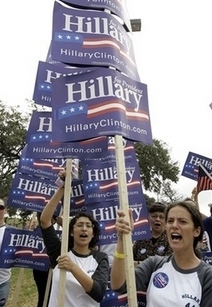In Democratic race, superdelegates to the rescue?
(Agencies)
Updated: 2008-03-06 13:46
Updated: 2008-03-06 13:46
If Barack Obama and Hillary Clinton cannot resolve their Democratic presidential battle, maybe the "superdelegates" can. The states of Michigan and Florida could also lend a hand.
While Clinton's wins in Ohio and Texas on Tuesday kept her White House hopes alive and prolonged the Democratic race, it also renewed attention on the party's 796 "superdelegates" -- Democratic officials and party insiders who are free to back any candidate at the August nominating convention.
|
|
Obama has a lead in pledged delegates won in state contests, but neither candidate is likely to gather enough of those to reach the 2,025 votes needed to clinch the nomination without help from the superdelegates.
Michigan and Florida, which lost their delegates in a dispute with the Democratic National Committee, also could play a role in reaching the magic number.
Clinton won unsanctioned contests in both states, although the candidates did not campaign in them and Obama removed his name from the ballot in Michigan. Officials in both states renewed calls to settle the dispute so their delegates can be seated.
"We must restore the rights of the more than 5 million voters whose voices have been silenced," Florida Gov. Charlie Crist, a Republican, and Michigan Gov. Jennifer Granholm, a Democrat, said in a joint statement.
Democratic National Committee Chairman Howard Dean welcomed the governors' effort to help resolve the issue, and also repeated a call for the Michigan and Florida state parties to follow the rules.
"Out of respect for the presidential campaigns and the states that did not violate party rules, we are not going to change the rules in the middle of the game," Dean said in a statement.
Resolving the issue might mean holding new contests if the state parties, the national party and the candidates could agree on the format, timing and financing.
"We're open to continuing to talk about it," said Mark Bubriski, a spokesman for the Florida Democratic Party. "We want to make sure Florida Democrats have their voices heard."
Clinton, a New York senator, has a slight lead over Obama among superdelegates, but Obama rang up about two dozen new endorsements during his February winning streak -- including some from former Clinton backers.
WOOING THE SUPERDELEGATES
Both campaigns have intensely courted the more than 350 superdelegates who remain uncommitted. A significant movement toward either candidate could decide the race.
Obama, an Illinois senator, said he believed the superdelegates would eventually line up behind the candidate who had won the most states and had the most pledged delegates -- and that would be him.
"My sense from talking to superdelegates is they will be more likely to rally around that candidate to be the Democratic standard-bearer," Obama told reporters.
Clinton adviser Harold Ickes said the unsettled race would make many superdelegates hesitate until the picture became a little clearer.
"The uncommitted superdelegates, or automatic delegates, are standing back, they are keeping their powder dry and they are watching this process unfold," Ickes said. "They are watching and waiting."
Many Democrats worry that superdelegates will override the will of voters and their prominence has sparked a broad debate about their role.
"One thing that superdelegates have for the most part is, in many instances, a working relationship with the nominees," said House Democratic Leader Steny Hoyer of Maryland, who is uncommitted. "They can make a judgment how effective they will be as leaders, as president."
"But I frankly don't expect that to be an issue," Hoyer said, predicting a nominee would be picked by voters before the party's August convention.
|
|
|
||
|
||
|
|
|
|
